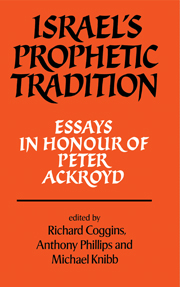Book contents
- Frontmatter
- Contents
- Preface
- Biographical note
- Abbreviations
- Note
- Prophecy in the ancient Near East
- The origins of prophecy in Israel
- Three classical prophets: Amos, Hosea and Micah
- The Isaiah tradition
- An alternative prophetic tradition?
- Visionary experience in Jeremiah
- The Ezekiel tradition: prophecy in a time of crisis
- The prophets of the restoration
- Prophecy and the emergence of the Jewish apocalypses
- Prophecy and wisdom
- Prophecy and the cult
- Prophecy and law
- A change of emphasis in the study of the prophets
- Martin Buber and the interpretation of the prophets
- Index of Biblical References
An alternative prophetic tradition?
Published online by Cambridge University Press: 09 January 2010
- Frontmatter
- Contents
- Preface
- Biographical note
- Abbreviations
- Note
- Prophecy in the ancient Near East
- The origins of prophecy in Israel
- Three classical prophets: Amos, Hosea and Micah
- The Isaiah tradition
- An alternative prophetic tradition?
- Visionary experience in Jeremiah
- The Ezekiel tradition: prophecy in a time of crisis
- The prophets of the restoration
- Prophecy and the emergence of the Jewish apocalypses
- Prophecy and wisdom
- Prophecy and the cult
- Prophecy and law
- A change of emphasis in the study of the prophets
- Martin Buber and the interpretation of the prophets
- Index of Biblical References
Summary
In the 1976 Book List of the Society for Old Testament Study Peter Ackroyd wrote an appreciative review of R. E. Clements' Prophecy and Tradition, which ended thus:
An excellent and stimulating survey; but there is very little concern with prophecy apart from the main figures, with little or no mention of Joel, Nahum, Habakkuk, Zephaniah, Haggai or Zechariah. It is essentially one prophetic pattern that is examined here; one has the uneasy feeling that if we knew more about other kinds of prophecy – often a field for extravagant speculation – we might see more clearly how this main ‘style’ has imposed itself and made us read all prophecy in one way.
The review is characteristic of its author both in its generous appreciation and in its care to warn that an accepted pattern or a scholarly consensus may need a greater degree of modification than would appear. Much study of the prophets in recent years has indeed assumed that one tradition can be invoked to account for all their characteristic concerns and emphases.
A generation ago the situation was markedly different. I. Engnell, in an article substantially dating from the 1940s, argued that ‘broadly speaking, the prophetic literature may be divided into two main types, which may be called the liturgy type and the diwan type’ (Engnell, 1970, p. 166), and he went on to list Joel, Habakkuk, Nahum and Deutero-Isaiah as characteristic examples of the ‘liturgy type’. Engnell's work aroused violent controversy in his own lifetime, and there have been few scholars outside Scandinavia who have accepted his views without drastic modification.
- Type
- Chapter
- Information
- Israel's Prophetic TraditionEssays in Honour of Peter R. Ackroyd, pp. 77 - 94Publisher: Cambridge University PressPrint publication year: 1982
- 3
- Cited by



